Family Law or Personal Law Case Study 2022
VerifiedAdded on 2022/09/18
|15
|3795
|20
AI Summary
Contribute Materials
Your contribution can guide someone’s learning journey. Share your
documents today.
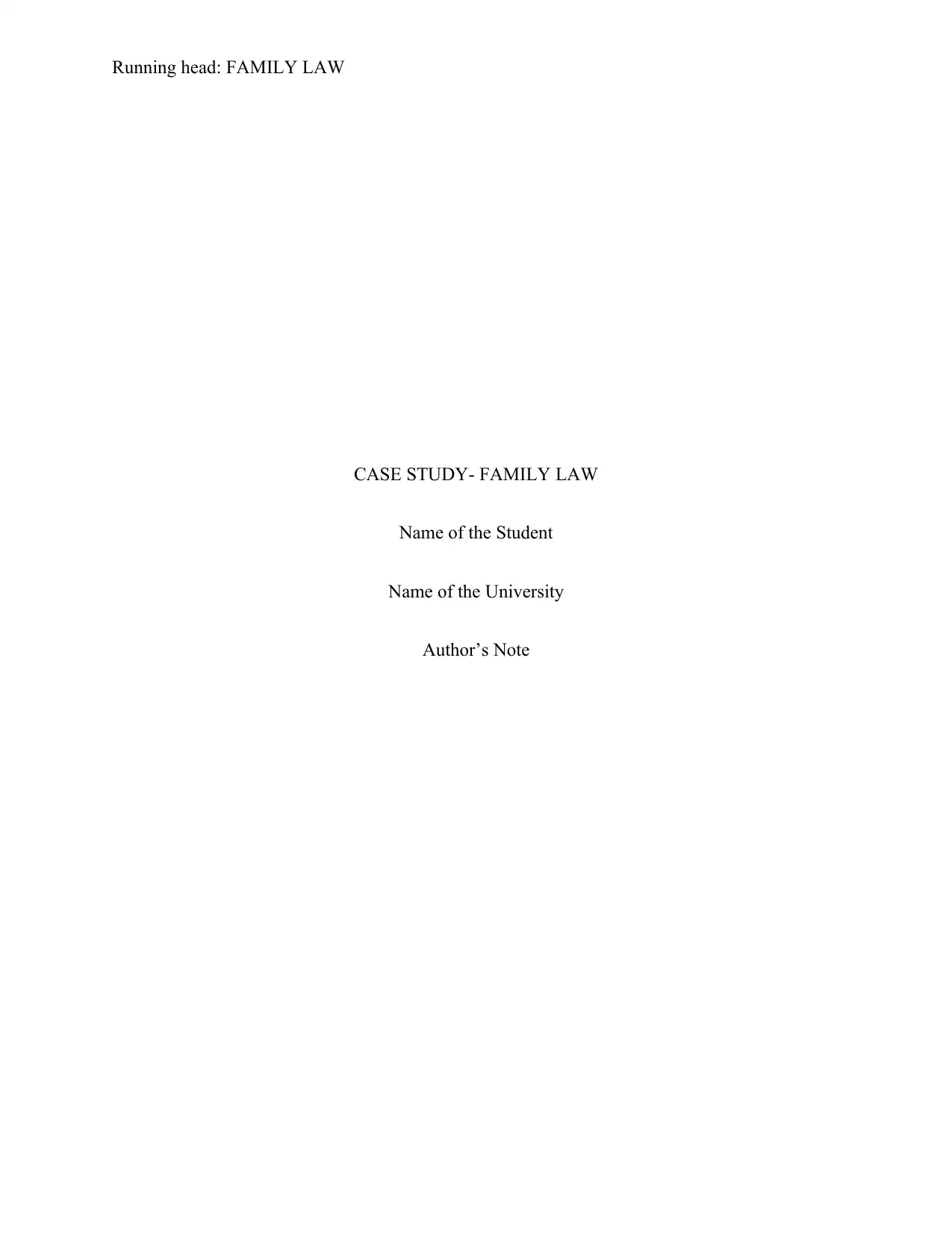
Running head: FAMILY LAW
CASE STUDY- FAMILY LAW
Name of the Student
Name of the University
Author’s Note
CASE STUDY- FAMILY LAW
Name of the Student
Name of the University
Author’s Note
Secure Best Marks with AI Grader
Need help grading? Try our AI Grader for instant feedback on your assignments.
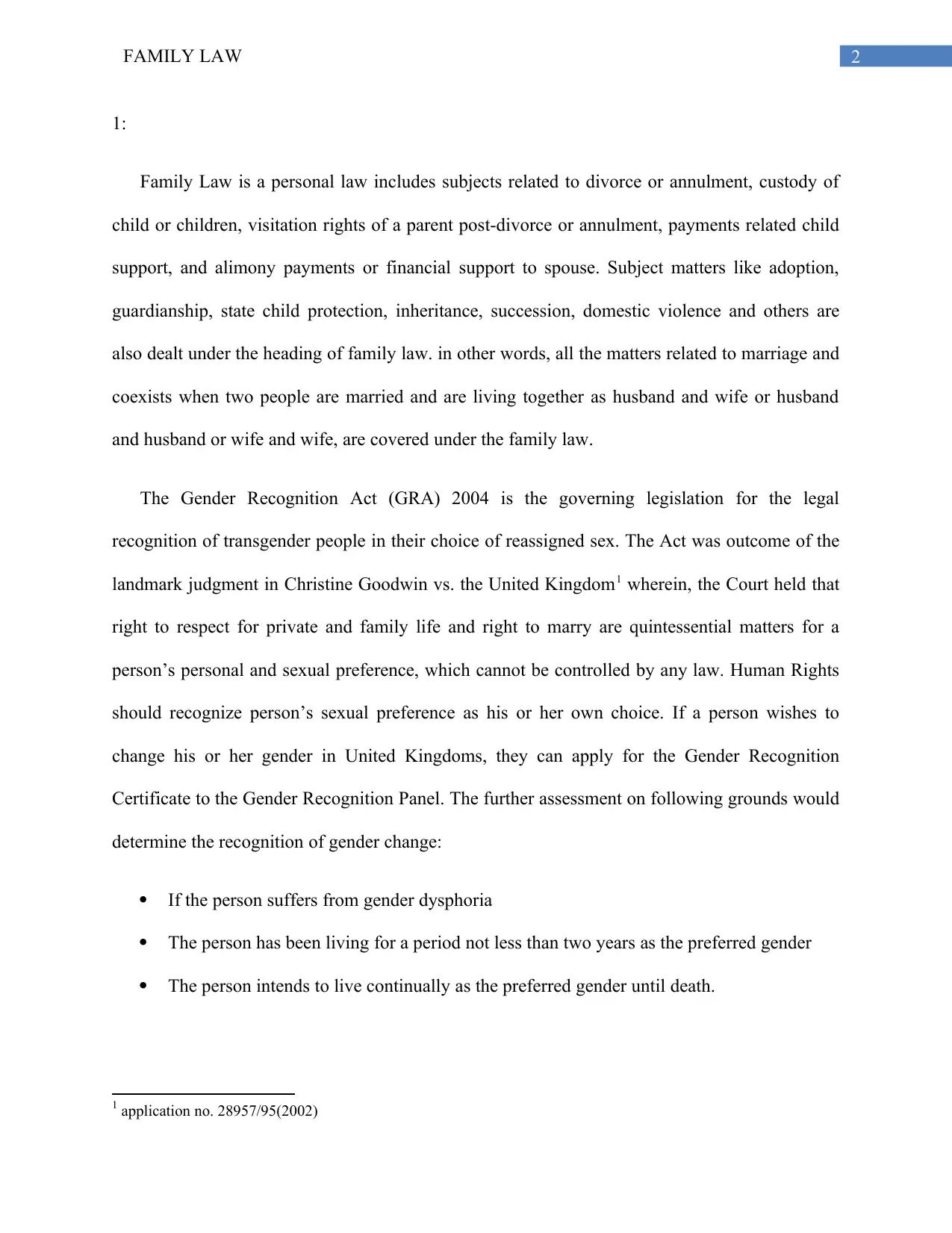
2FAMILY LAW
1:
Family Law is a personal law includes subjects related to divorce or annulment, custody of
child or children, visitation rights of a parent post-divorce or annulment, payments related child
support, and alimony payments or financial support to spouse. Subject matters like adoption,
guardianship, state child protection, inheritance, succession, domestic violence and others are
also dealt under the heading of family law. in other words, all the matters related to marriage and
coexists when two people are married and are living together as husband and wife or husband
and husband or wife and wife, are covered under the family law.
The Gender Recognition Act (GRA) 2004 is the governing legislation for the legal
recognition of transgender people in their choice of reassigned sex. The Act was outcome of the
landmark judgment in Christine Goodwin vs. the United Kingdom1 wherein, the Court held that
right to respect for private and family life and right to marry are quintessential matters for a
person’s personal and sexual preference, which cannot be controlled by any law. Human Rights
should recognize person’s sexual preference as his or her own choice. If a person wishes to
change his or her gender in United Kingdoms, they can apply for the Gender Recognition
Certificate to the Gender Recognition Panel. The further assessment on following grounds would
determine the recognition of gender change:
If the person suffers from gender dysphoria
The person has been living for a period not less than two years as the preferred gender
The person intends to live continually as the preferred gender until death.
1 application no. 28957/95(2002)
1:
Family Law is a personal law includes subjects related to divorce or annulment, custody of
child or children, visitation rights of a parent post-divorce or annulment, payments related child
support, and alimony payments or financial support to spouse. Subject matters like adoption,
guardianship, state child protection, inheritance, succession, domestic violence and others are
also dealt under the heading of family law. in other words, all the matters related to marriage and
coexists when two people are married and are living together as husband and wife or husband
and husband or wife and wife, are covered under the family law.
The Gender Recognition Act (GRA) 2004 is the governing legislation for the legal
recognition of transgender people in their choice of reassigned sex. The Act was outcome of the
landmark judgment in Christine Goodwin vs. the United Kingdom1 wherein, the Court held that
right to respect for private and family life and right to marry are quintessential matters for a
person’s personal and sexual preference, which cannot be controlled by any law. Human Rights
should recognize person’s sexual preference as his or her own choice. If a person wishes to
change his or her gender in United Kingdoms, they can apply for the Gender Recognition
Certificate to the Gender Recognition Panel. The further assessment on following grounds would
determine the recognition of gender change:
If the person suffers from gender dysphoria
The person has been living for a period not less than two years as the preferred gender
The person intends to live continually as the preferred gender until death.
1 application no. 28957/95(2002)
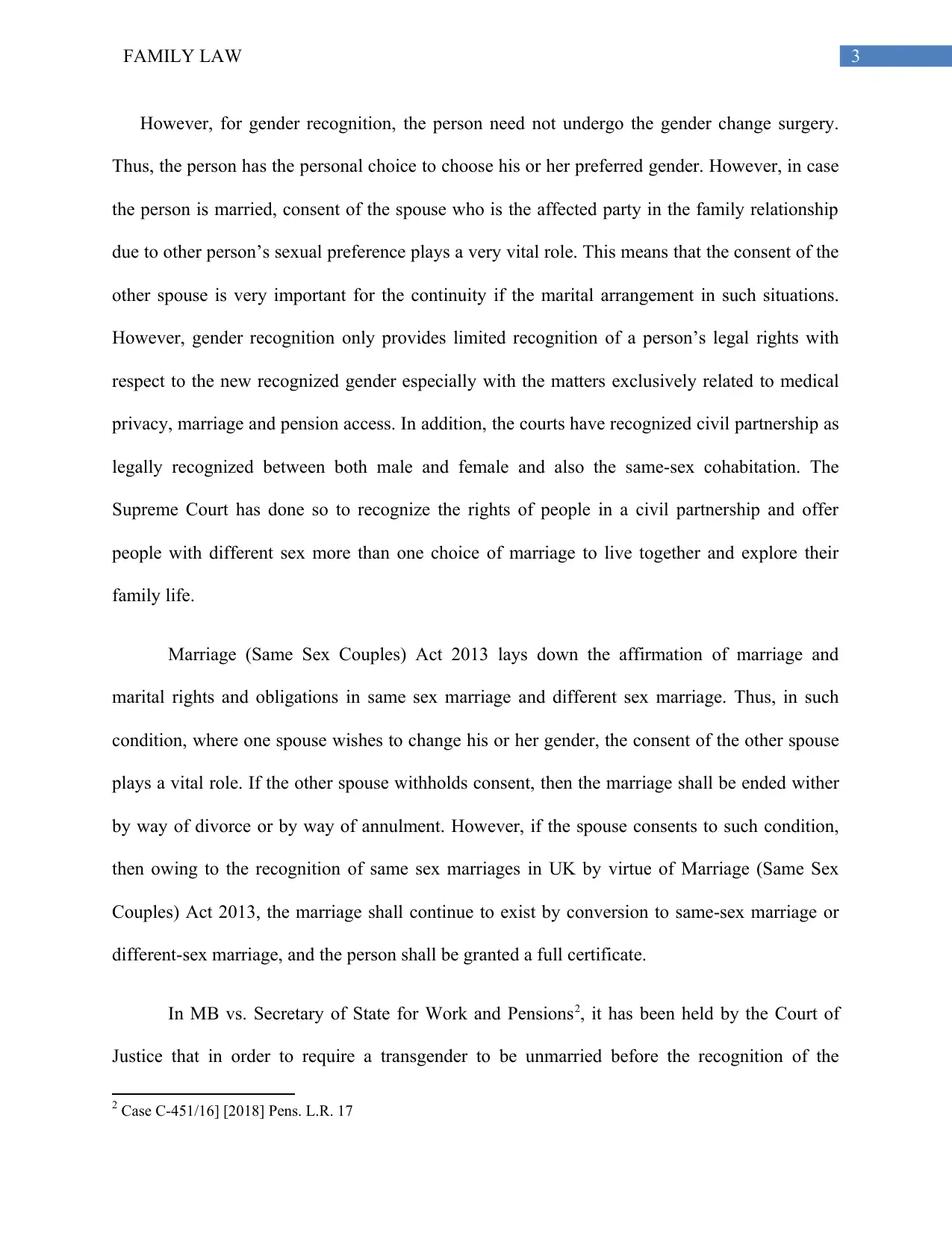
3FAMILY LAW
However, for gender recognition, the person need not undergo the gender change surgery.
Thus, the person has the personal choice to choose his or her preferred gender. However, in case
the person is married, consent of the spouse who is the affected party in the family relationship
due to other person’s sexual preference plays a very vital role. This means that the consent of the
other spouse is very important for the continuity if the marital arrangement in such situations.
However, gender recognition only provides limited recognition of a person’s legal rights with
respect to the new recognized gender especially with the matters exclusively related to medical
privacy, marriage and pension access. In addition, the courts have recognized civil partnership as
legally recognized between both male and female and also the same-sex cohabitation. The
Supreme Court has done so to recognize the rights of people in a civil partnership and offer
people with different sex more than one choice of marriage to live together and explore their
family life.
Marriage (Same Sex Couples) Act 2013 lays down the affirmation of marriage and
marital rights and obligations in same sex marriage and different sex marriage. Thus, in such
condition, where one spouse wishes to change his or her gender, the consent of the other spouse
plays a vital role. If the other spouse withholds consent, then the marriage shall be ended wither
by way of divorce or by way of annulment. However, if the spouse consents to such condition,
then owing to the recognition of same sex marriages in UK by virtue of Marriage (Same Sex
Couples) Act 2013, the marriage shall continue to exist by conversion to same-sex marriage or
different-sex marriage, and the person shall be granted a full certificate.
In MB vs. Secretary of State for Work and Pensions2, it has been held by the Court of
Justice that in order to require a transgender to be unmarried before the recognition of the
2 Case C-451/16] [2018] Pens. L.R. 17
However, for gender recognition, the person need not undergo the gender change surgery.
Thus, the person has the personal choice to choose his or her preferred gender. However, in case
the person is married, consent of the spouse who is the affected party in the family relationship
due to other person’s sexual preference plays a very vital role. This means that the consent of the
other spouse is very important for the continuity if the marital arrangement in such situations.
However, gender recognition only provides limited recognition of a person’s legal rights with
respect to the new recognized gender especially with the matters exclusively related to medical
privacy, marriage and pension access. In addition, the courts have recognized civil partnership as
legally recognized between both male and female and also the same-sex cohabitation. The
Supreme Court has done so to recognize the rights of people in a civil partnership and offer
people with different sex more than one choice of marriage to live together and explore their
family life.
Marriage (Same Sex Couples) Act 2013 lays down the affirmation of marriage and
marital rights and obligations in same sex marriage and different sex marriage. Thus, in such
condition, where one spouse wishes to change his or her gender, the consent of the other spouse
plays a vital role. If the other spouse withholds consent, then the marriage shall be ended wither
by way of divorce or by way of annulment. However, if the spouse consents to such condition,
then owing to the recognition of same sex marriages in UK by virtue of Marriage (Same Sex
Couples) Act 2013, the marriage shall continue to exist by conversion to same-sex marriage or
different-sex marriage, and the person shall be granted a full certificate.
In MB vs. Secretary of State for Work and Pensions2, it has been held by the Court of
Justice that in order to require a transgender to be unmarried before the recognition of the
2 Case C-451/16] [2018] Pens. L.R. 17
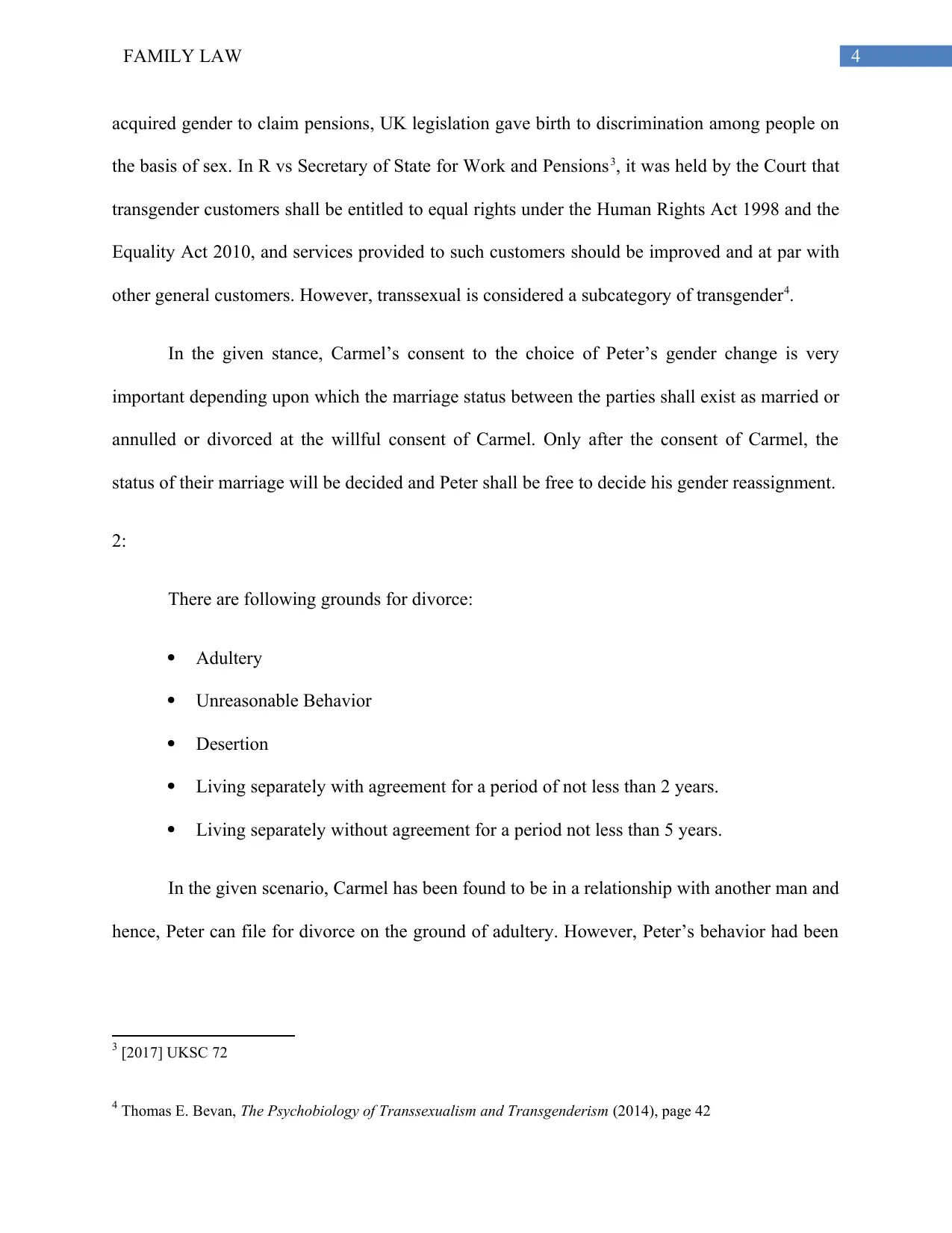
4FAMILY LAW
acquired gender to claim pensions, UK legislation gave birth to discrimination among people on
the basis of sex. In R vs Secretary of State for Work and Pensions3, it was held by the Court that
transgender customers shall be entitled to equal rights under the Human Rights Act 1998 and the
Equality Act 2010, and services provided to such customers should be improved and at par with
other general customers. However, transsexual is considered a subcategory of transgender4.
In the given stance, Carmel’s consent to the choice of Peter’s gender change is very
important depending upon which the marriage status between the parties shall exist as married or
annulled or divorced at the willful consent of Carmel. Only after the consent of Carmel, the
status of their marriage will be decided and Peter shall be free to decide his gender reassignment.
2:
There are following grounds for divorce:
Adultery
Unreasonable Behavior
Desertion
Living separately with agreement for a period of not less than 2 years.
Living separately without agreement for a period not less than 5 years.
In the given scenario, Carmel has been found to be in a relationship with another man and
hence, Peter can file for divorce on the ground of adultery. However, Peter’s behavior had been
3 [2017] UKSC 72
4 Thomas E. Bevan, The Psychobiology of Transsexualism and Transgenderism (2014), page 42
acquired gender to claim pensions, UK legislation gave birth to discrimination among people on
the basis of sex. In R vs Secretary of State for Work and Pensions3, it was held by the Court that
transgender customers shall be entitled to equal rights under the Human Rights Act 1998 and the
Equality Act 2010, and services provided to such customers should be improved and at par with
other general customers. However, transsexual is considered a subcategory of transgender4.
In the given stance, Carmel’s consent to the choice of Peter’s gender change is very
important depending upon which the marriage status between the parties shall exist as married or
annulled or divorced at the willful consent of Carmel. Only after the consent of Carmel, the
status of their marriage will be decided and Peter shall be free to decide his gender reassignment.
2:
There are following grounds for divorce:
Adultery
Unreasonable Behavior
Desertion
Living separately with agreement for a period of not less than 2 years.
Living separately without agreement for a period not less than 5 years.
In the given scenario, Carmel has been found to be in a relationship with another man and
hence, Peter can file for divorce on the ground of adultery. However, Peter’s behavior had been
3 [2017] UKSC 72
4 Thomas E. Bevan, The Psychobiology of Transsexualism and Transgenderism (2014), page 42
Secure Best Marks with AI Grader
Need help grading? Try our AI Grader for instant feedback on your assignments.
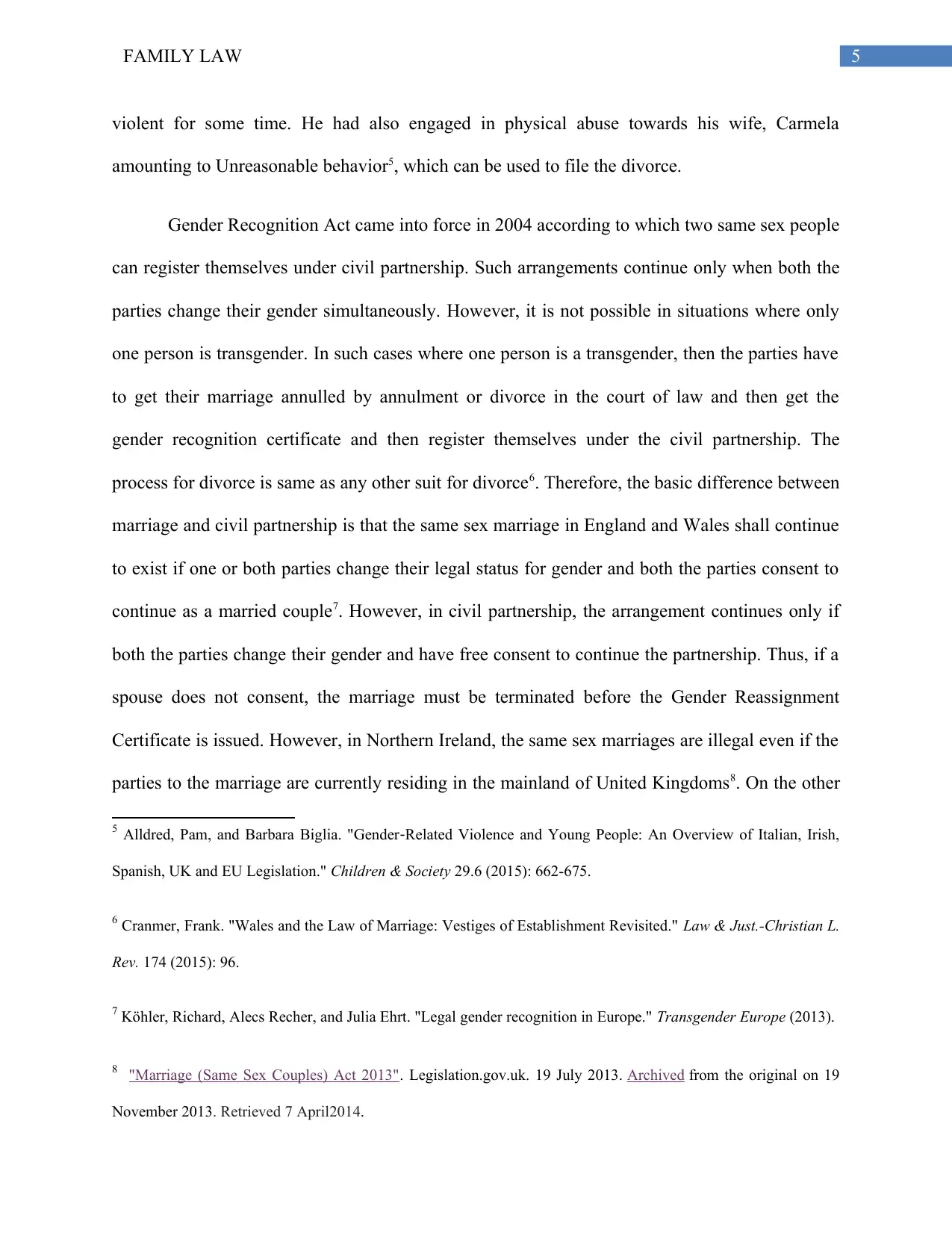
5FAMILY LAW
violent for some time. He had also engaged in physical abuse towards his wife, Carmela
amounting to Unreasonable behavior5, which can be used to file the divorce.
Gender Recognition Act came into force in 2004 according to which two same sex people
can register themselves under civil partnership. Such arrangements continue only when both the
parties change their gender simultaneously. However, it is not possible in situations where only
one person is transgender. In such cases where one person is a transgender, then the parties have
to get their marriage annulled by annulment or divorce in the court of law and then get the
gender recognition certificate and then register themselves under the civil partnership. The
process for divorce is same as any other suit for divorce6. Therefore, the basic difference between
marriage and civil partnership is that the same sex marriage in England and Wales shall continue
to exist if one or both parties change their legal status for gender and both the parties consent to
continue as a married couple7. However, in civil partnership, the arrangement continues only if
both the parties change their gender and have free consent to continue the partnership. Thus, if a
spouse does not consent, the marriage must be terminated before the Gender Reassignment
Certificate is issued. However, in Northern Ireland, the same sex marriages are illegal even if the
parties to the marriage are currently residing in the mainland of United Kingdoms8. On the other
5 Alldred, Pam, and Barbara Biglia. "Gender‐Related Violence and Young People: An Overview of Italian, Irish,
Spanish, UK and EU Legislation." Children & Society 29.6 (2015): 662-675.
6 Cranmer, Frank. "Wales and the Law of Marriage: Vestiges of Establishment Revisited." Law & Just.-Christian L.
Rev. 174 (2015): 96.
7 Köhler, Richard, Alecs Recher, and Julia Ehrt. "Legal gender recognition in Europe." Transgender Europe (2013).
8 "Marriage (Same Sex Couples) Act 2013". Legislation.gov.uk. 19 July 2013. Archived from the original on 19
November 2013. Retrieved 7 April2014.
violent for some time. He had also engaged in physical abuse towards his wife, Carmela
amounting to Unreasonable behavior5, which can be used to file the divorce.
Gender Recognition Act came into force in 2004 according to which two same sex people
can register themselves under civil partnership. Such arrangements continue only when both the
parties change their gender simultaneously. However, it is not possible in situations where only
one person is transgender. In such cases where one person is a transgender, then the parties have
to get their marriage annulled by annulment or divorce in the court of law and then get the
gender recognition certificate and then register themselves under the civil partnership. The
process for divorce is same as any other suit for divorce6. Therefore, the basic difference between
marriage and civil partnership is that the same sex marriage in England and Wales shall continue
to exist if one or both parties change their legal status for gender and both the parties consent to
continue as a married couple7. However, in civil partnership, the arrangement continues only if
both the parties change their gender and have free consent to continue the partnership. Thus, if a
spouse does not consent, the marriage must be terminated before the Gender Reassignment
Certificate is issued. However, in Northern Ireland, the same sex marriages are illegal even if the
parties to the marriage are currently residing in the mainland of United Kingdoms8. On the other
5 Alldred, Pam, and Barbara Biglia. "Gender‐Related Violence and Young People: An Overview of Italian, Irish,
Spanish, UK and EU Legislation." Children & Society 29.6 (2015): 662-675.
6 Cranmer, Frank. "Wales and the Law of Marriage: Vestiges of Establishment Revisited." Law & Just.-Christian L.
Rev. 174 (2015): 96.
7 Köhler, Richard, Alecs Recher, and Julia Ehrt. "Legal gender recognition in Europe." Transgender Europe (2013).
8 "Marriage (Same Sex Couples) Act 2013". Legislation.gov.uk. 19 July 2013. Archived from the original on 19
November 2013. Retrieved 7 April2014.
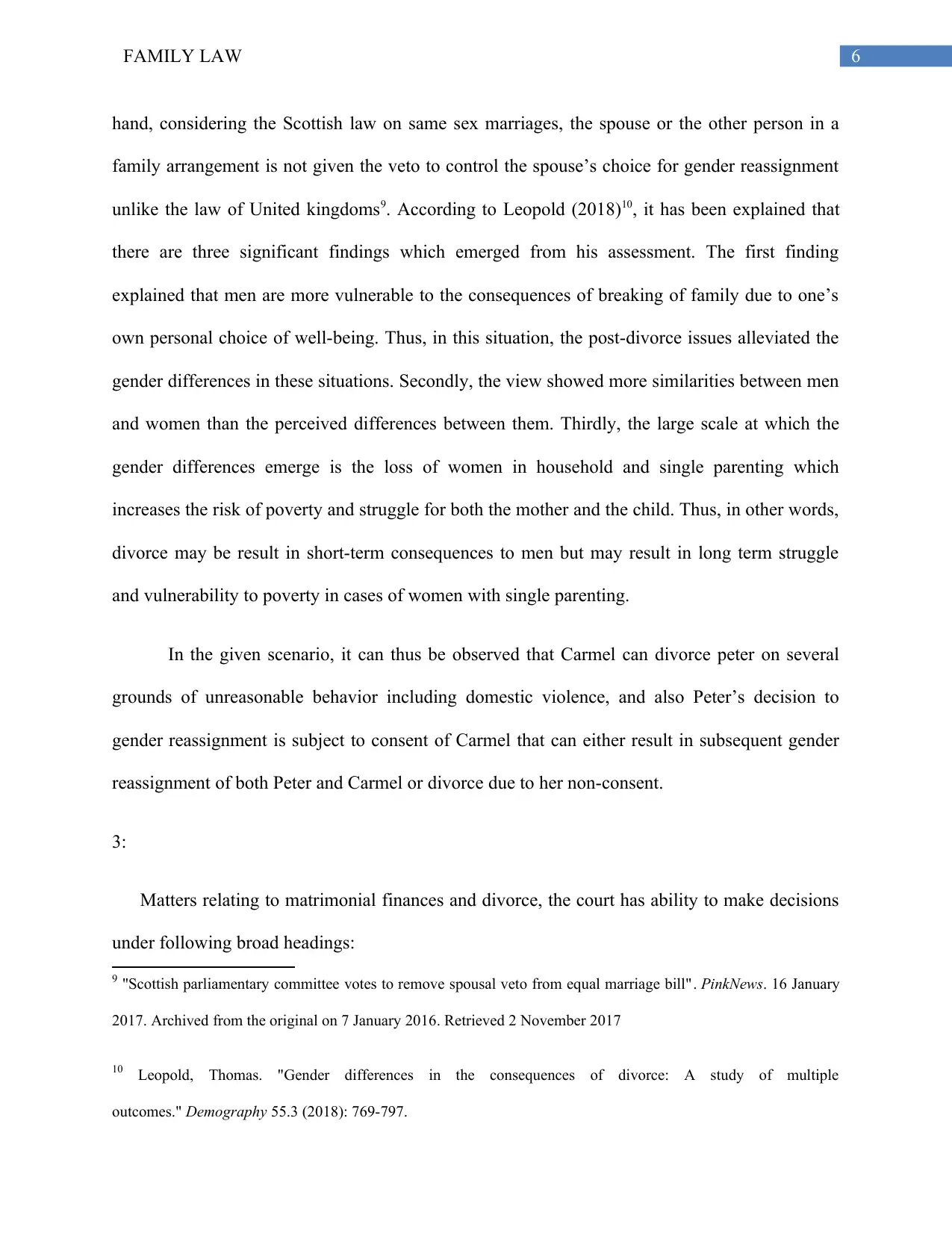
6FAMILY LAW
hand, considering the Scottish law on same sex marriages, the spouse or the other person in a
family arrangement is not given the veto to control the spouse’s choice for gender reassignment
unlike the law of United kingdoms9. According to Leopold (2018)10, it has been explained that
there are three significant findings which emerged from his assessment. The first finding
explained that men are more vulnerable to the consequences of breaking of family due to one’s
own personal choice of well-being. Thus, in this situation, the post-divorce issues alleviated the
gender differences in these situations. Secondly, the view showed more similarities between men
and women than the perceived differences between them. Thirdly, the large scale at which the
gender differences emerge is the loss of women in household and single parenting which
increases the risk of poverty and struggle for both the mother and the child. Thus, in other words,
divorce may be result in short-term consequences to men but may result in long term struggle
and vulnerability to poverty in cases of women with single parenting.
In the given scenario, it can thus be observed that Carmel can divorce peter on several
grounds of unreasonable behavior including domestic violence, and also Peter’s decision to
gender reassignment is subject to consent of Carmel that can either result in subsequent gender
reassignment of both Peter and Carmel or divorce due to her non-consent.
3:
Matters relating to matrimonial finances and divorce, the court has ability to make decisions
under following broad headings:
9 "Scottish parliamentary committee votes to remove spousal veto from equal marriage bill". PinkNews. 16 January
2017. Archived from the original on 7 January 2016. Retrieved 2 November 2017
10 Leopold, Thomas. "Gender differences in the consequences of divorce: A study of multiple
outcomes." Demography 55.3 (2018): 769-797.
hand, considering the Scottish law on same sex marriages, the spouse or the other person in a
family arrangement is not given the veto to control the spouse’s choice for gender reassignment
unlike the law of United kingdoms9. According to Leopold (2018)10, it has been explained that
there are three significant findings which emerged from his assessment. The first finding
explained that men are more vulnerable to the consequences of breaking of family due to one’s
own personal choice of well-being. Thus, in this situation, the post-divorce issues alleviated the
gender differences in these situations. Secondly, the view showed more similarities between men
and women than the perceived differences between them. Thirdly, the large scale at which the
gender differences emerge is the loss of women in household and single parenting which
increases the risk of poverty and struggle for both the mother and the child. Thus, in other words,
divorce may be result in short-term consequences to men but may result in long term struggle
and vulnerability to poverty in cases of women with single parenting.
In the given scenario, it can thus be observed that Carmel can divorce peter on several
grounds of unreasonable behavior including domestic violence, and also Peter’s decision to
gender reassignment is subject to consent of Carmel that can either result in subsequent gender
reassignment of both Peter and Carmel or divorce due to her non-consent.
3:
Matters relating to matrimonial finances and divorce, the court has ability to make decisions
under following broad headings:
9 "Scottish parliamentary committee votes to remove spousal veto from equal marriage bill". PinkNews. 16 January
2017. Archived from the original on 7 January 2016. Retrieved 2 November 2017
10 Leopold, Thomas. "Gender differences in the consequences of divorce: A study of multiple
outcomes." Demography 55.3 (2018): 769-797.
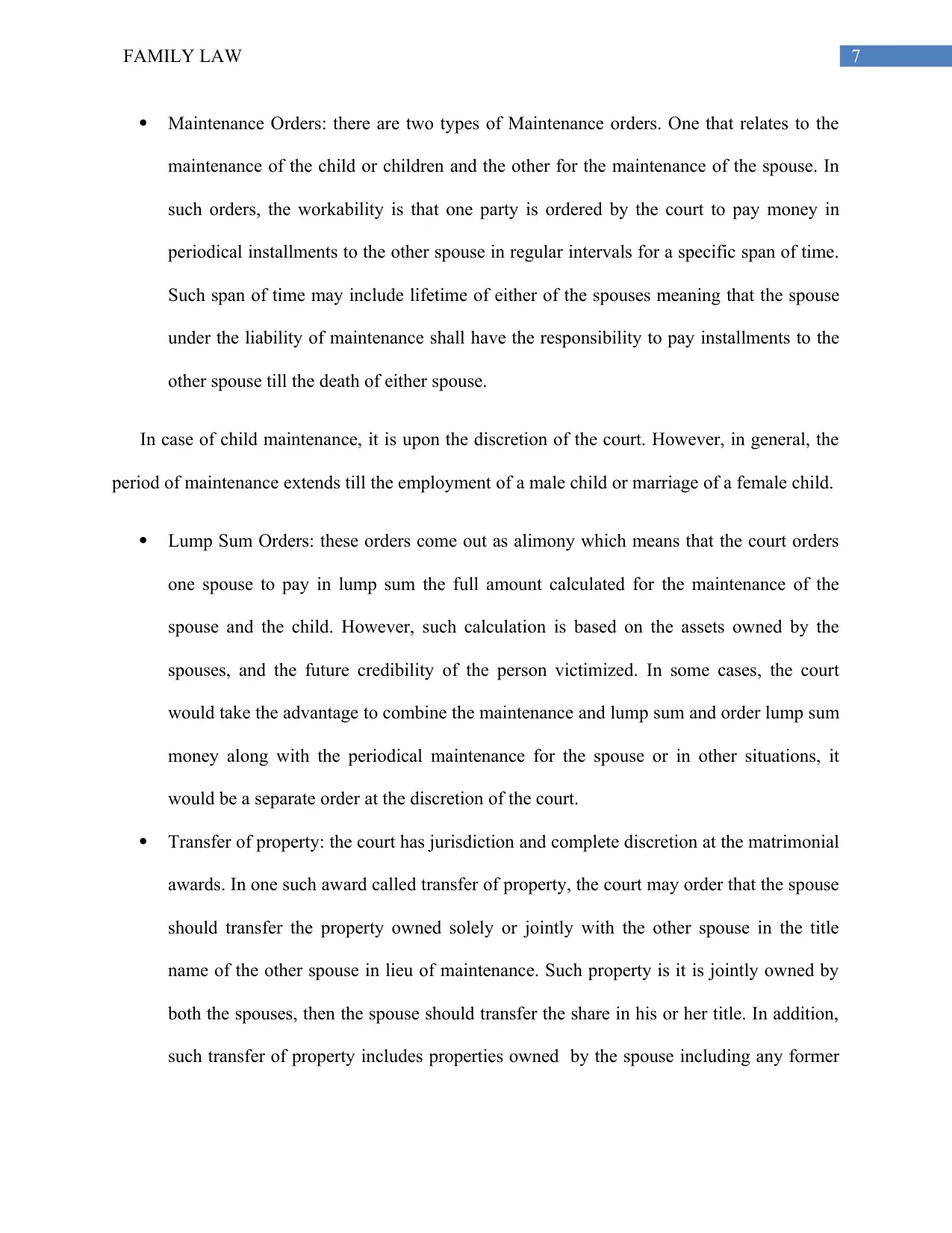
7FAMILY LAW
Maintenance Orders: there are two types of Maintenance orders. One that relates to the
maintenance of the child or children and the other for the maintenance of the spouse. In
such orders, the workability is that one party is ordered by the court to pay money in
periodical installments to the other spouse in regular intervals for a specific span of time.
Such span of time may include lifetime of either of the spouses meaning that the spouse
under the liability of maintenance shall have the responsibility to pay installments to the
other spouse till the death of either spouse.
In case of child maintenance, it is upon the discretion of the court. However, in general, the
period of maintenance extends till the employment of a male child or marriage of a female child.
Lump Sum Orders: these orders come out as alimony which means that the court orders
one spouse to pay in lump sum the full amount calculated for the maintenance of the
spouse and the child. However, such calculation is based on the assets owned by the
spouses, and the future credibility of the person victimized. In some cases, the court
would take the advantage to combine the maintenance and lump sum and order lump sum
money along with the periodical maintenance for the spouse or in other situations, it
would be a separate order at the discretion of the court.
Transfer of property: the court has jurisdiction and complete discretion at the matrimonial
awards. In one such award called transfer of property, the court may order that the spouse
should transfer the property owned solely or jointly with the other spouse in the title
name of the other spouse in lieu of maintenance. Such property is it is jointly owned by
both the spouses, then the spouse should transfer the share in his or her title. In addition,
such transfer of property includes properties owned by the spouse including any former
Maintenance Orders: there are two types of Maintenance orders. One that relates to the
maintenance of the child or children and the other for the maintenance of the spouse. In
such orders, the workability is that one party is ordered by the court to pay money in
periodical installments to the other spouse in regular intervals for a specific span of time.
Such span of time may include lifetime of either of the spouses meaning that the spouse
under the liability of maintenance shall have the responsibility to pay installments to the
other spouse till the death of either spouse.
In case of child maintenance, it is upon the discretion of the court. However, in general, the
period of maintenance extends till the employment of a male child or marriage of a female child.
Lump Sum Orders: these orders come out as alimony which means that the court orders
one spouse to pay in lump sum the full amount calculated for the maintenance of the
spouse and the child. However, such calculation is based on the assets owned by the
spouses, and the future credibility of the person victimized. In some cases, the court
would take the advantage to combine the maintenance and lump sum and order lump sum
money along with the periodical maintenance for the spouse or in other situations, it
would be a separate order at the discretion of the court.
Transfer of property: the court has jurisdiction and complete discretion at the matrimonial
awards. In one such award called transfer of property, the court may order that the spouse
should transfer the property owned solely or jointly with the other spouse in the title
name of the other spouse in lieu of maintenance. Such property is it is jointly owned by
both the spouses, then the spouse should transfer the share in his or her title. In addition,
such transfer of property includes properties owned by the spouse including any former
Paraphrase This Document
Need a fresh take? Get an instant paraphrase of this document with our AI Paraphraser
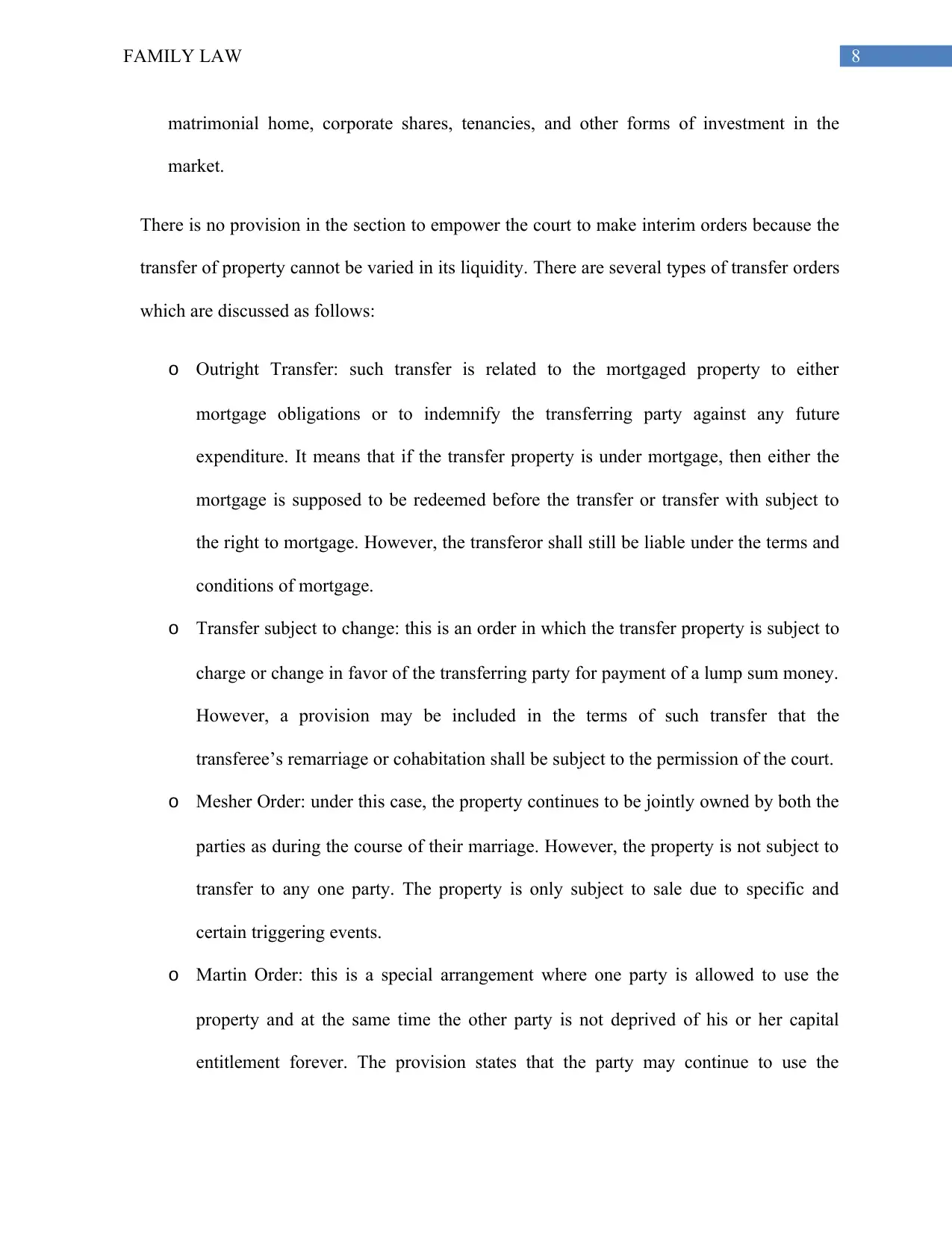
8FAMILY LAW
matrimonial home, corporate shares, tenancies, and other forms of investment in the
market.
There is no provision in the section to empower the court to make interim orders because the
transfer of property cannot be varied in its liquidity. There are several types of transfer orders
which are discussed as follows:
o Outright Transfer: such transfer is related to the mortgaged property to either
mortgage obligations or to indemnify the transferring party against any future
expenditure. It means that if the transfer property is under mortgage, then either the
mortgage is supposed to be redeemed before the transfer or transfer with subject to
the right to mortgage. However, the transferor shall still be liable under the terms and
conditions of mortgage.
o Transfer subject to change: this is an order in which the transfer property is subject to
charge or change in favor of the transferring party for payment of a lump sum money.
However, a provision may be included in the terms of such transfer that the
transferee’s remarriage or cohabitation shall be subject to the permission of the court.
o Mesher Order: under this case, the property continues to be jointly owned by both the
parties as during the course of their marriage. However, the property is not subject to
transfer to any one party. The property is only subject to sale due to specific and
certain triggering events.
o Martin Order: this is a special arrangement where one party is allowed to use the
property and at the same time the other party is not deprived of his or her capital
entitlement forever. The provision states that the party may continue to use the
matrimonial home, corporate shares, tenancies, and other forms of investment in the
market.
There is no provision in the section to empower the court to make interim orders because the
transfer of property cannot be varied in its liquidity. There are several types of transfer orders
which are discussed as follows:
o Outright Transfer: such transfer is related to the mortgaged property to either
mortgage obligations or to indemnify the transferring party against any future
expenditure. It means that if the transfer property is under mortgage, then either the
mortgage is supposed to be redeemed before the transfer or transfer with subject to
the right to mortgage. However, the transferor shall still be liable under the terms and
conditions of mortgage.
o Transfer subject to change: this is an order in which the transfer property is subject to
charge or change in favor of the transferring party for payment of a lump sum money.
However, a provision may be included in the terms of such transfer that the
transferee’s remarriage or cohabitation shall be subject to the permission of the court.
o Mesher Order: under this case, the property continues to be jointly owned by both the
parties as during the course of their marriage. However, the property is not subject to
transfer to any one party. The property is only subject to sale due to specific and
certain triggering events.
o Martin Order: this is a special arrangement where one party is allowed to use the
property and at the same time the other party is not deprived of his or her capital
entitlement forever. The provision states that the party may continue to use the
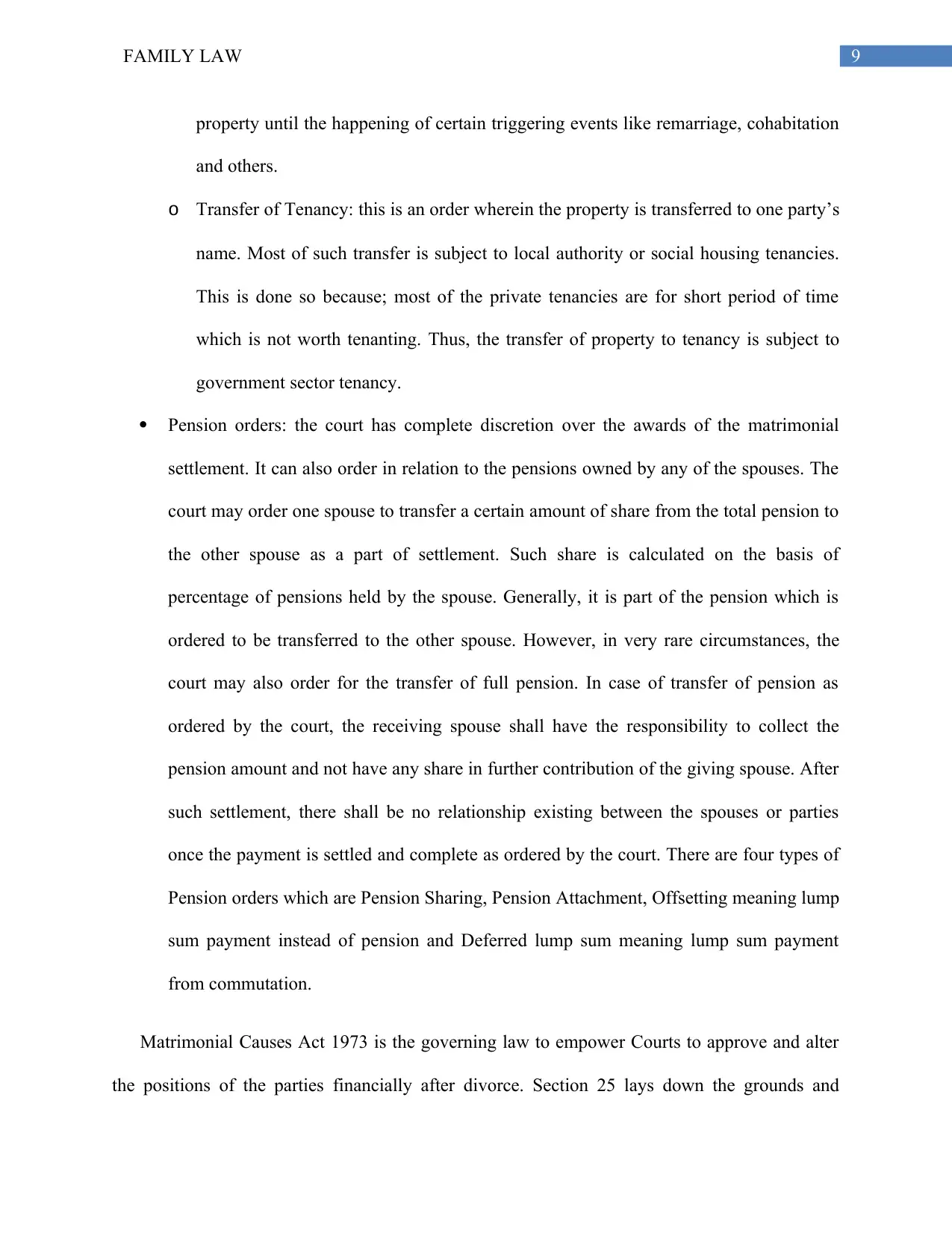
9FAMILY LAW
property until the happening of certain triggering events like remarriage, cohabitation
and others.
o Transfer of Tenancy: this is an order wherein the property is transferred to one party’s
name. Most of such transfer is subject to local authority or social housing tenancies.
This is done so because; most of the private tenancies are for short period of time
which is not worth tenanting. Thus, the transfer of property to tenancy is subject to
government sector tenancy.
Pension orders: the court has complete discretion over the awards of the matrimonial
settlement. It can also order in relation to the pensions owned by any of the spouses. The
court may order one spouse to transfer a certain amount of share from the total pension to
the other spouse as a part of settlement. Such share is calculated on the basis of
percentage of pensions held by the spouse. Generally, it is part of the pension which is
ordered to be transferred to the other spouse. However, in very rare circumstances, the
court may also order for the transfer of full pension. In case of transfer of pension as
ordered by the court, the receiving spouse shall have the responsibility to collect the
pension amount and not have any share in further contribution of the giving spouse. After
such settlement, there shall be no relationship existing between the spouses or parties
once the payment is settled and complete as ordered by the court. There are four types of
Pension orders which are Pension Sharing, Pension Attachment, Offsetting meaning lump
sum payment instead of pension and Deferred lump sum meaning lump sum payment
from commutation.
Matrimonial Causes Act 1973 is the governing law to empower Courts to approve and alter
the positions of the parties financially after divorce. Section 25 lays down the grounds and
property until the happening of certain triggering events like remarriage, cohabitation
and others.
o Transfer of Tenancy: this is an order wherein the property is transferred to one party’s
name. Most of such transfer is subject to local authority or social housing tenancies.
This is done so because; most of the private tenancies are for short period of time
which is not worth tenanting. Thus, the transfer of property to tenancy is subject to
government sector tenancy.
Pension orders: the court has complete discretion over the awards of the matrimonial
settlement. It can also order in relation to the pensions owned by any of the spouses. The
court may order one spouse to transfer a certain amount of share from the total pension to
the other spouse as a part of settlement. Such share is calculated on the basis of
percentage of pensions held by the spouse. Generally, it is part of the pension which is
ordered to be transferred to the other spouse. However, in very rare circumstances, the
court may also order for the transfer of full pension. In case of transfer of pension as
ordered by the court, the receiving spouse shall have the responsibility to collect the
pension amount and not have any share in further contribution of the giving spouse. After
such settlement, there shall be no relationship existing between the spouses or parties
once the payment is settled and complete as ordered by the court. There are four types of
Pension orders which are Pension Sharing, Pension Attachment, Offsetting meaning lump
sum payment instead of pension and Deferred lump sum meaning lump sum payment
from commutation.
Matrimonial Causes Act 1973 is the governing law to empower Courts to approve and alter
the positions of the parties financially after divorce. Section 25 lays down the grounds and
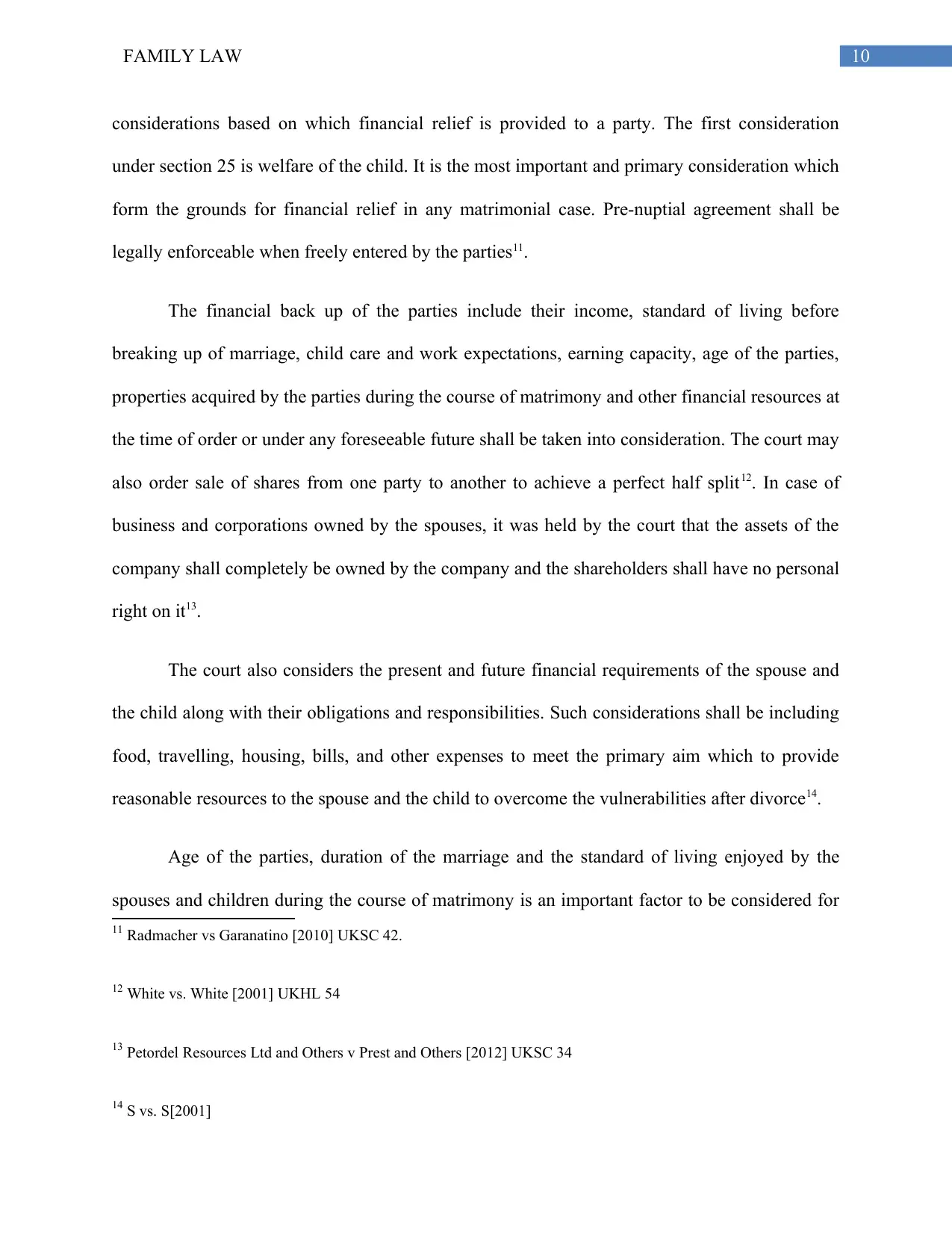
10FAMILY LAW
considerations based on which financial relief is provided to a party. The first consideration
under section 25 is welfare of the child. It is the most important and primary consideration which
form the grounds for financial relief in any matrimonial case. Pre-nuptial agreement shall be
legally enforceable when freely entered by the parties11.
The financial back up of the parties include their income, standard of living before
breaking up of marriage, child care and work expectations, earning capacity, age of the parties,
properties acquired by the parties during the course of matrimony and other financial resources at
the time of order or under any foreseeable future shall be taken into consideration. The court may
also order sale of shares from one party to another to achieve a perfect half split12. In case of
business and corporations owned by the spouses, it was held by the court that the assets of the
company shall completely be owned by the company and the shareholders shall have no personal
right on it13.
The court also considers the present and future financial requirements of the spouse and
the child along with their obligations and responsibilities. Such considerations shall be including
food, travelling, housing, bills, and other expenses to meet the primary aim which to provide
reasonable resources to the spouse and the child to overcome the vulnerabilities after divorce14.
Age of the parties, duration of the marriage and the standard of living enjoyed by the
spouses and children during the course of matrimony is an important factor to be considered for
11 Radmacher vs Garanatino [2010] UKSC 42.
12 White vs. White [2001] UKHL 54
13 Petordel Resources Ltd and Others v Prest and Others [2012] UKSC 34
14 S vs. S[2001]
considerations based on which financial relief is provided to a party. The first consideration
under section 25 is welfare of the child. It is the most important and primary consideration which
form the grounds for financial relief in any matrimonial case. Pre-nuptial agreement shall be
legally enforceable when freely entered by the parties11.
The financial back up of the parties include their income, standard of living before
breaking up of marriage, child care and work expectations, earning capacity, age of the parties,
properties acquired by the parties during the course of matrimony and other financial resources at
the time of order or under any foreseeable future shall be taken into consideration. The court may
also order sale of shares from one party to another to achieve a perfect half split12. In case of
business and corporations owned by the spouses, it was held by the court that the assets of the
company shall completely be owned by the company and the shareholders shall have no personal
right on it13.
The court also considers the present and future financial requirements of the spouse and
the child along with their obligations and responsibilities. Such considerations shall be including
food, travelling, housing, bills, and other expenses to meet the primary aim which to provide
reasonable resources to the spouse and the child to overcome the vulnerabilities after divorce14.
Age of the parties, duration of the marriage and the standard of living enjoyed by the
spouses and children during the course of matrimony is an important factor to be considered for
11 Radmacher vs Garanatino [2010] UKSC 42.
12 White vs. White [2001] UKHL 54
13 Petordel Resources Ltd and Others v Prest and Others [2012] UKSC 34
14 S vs. S[2001]
Secure Best Marks with AI Grader
Need help grading? Try our AI Grader for instant feedback on your assignments.
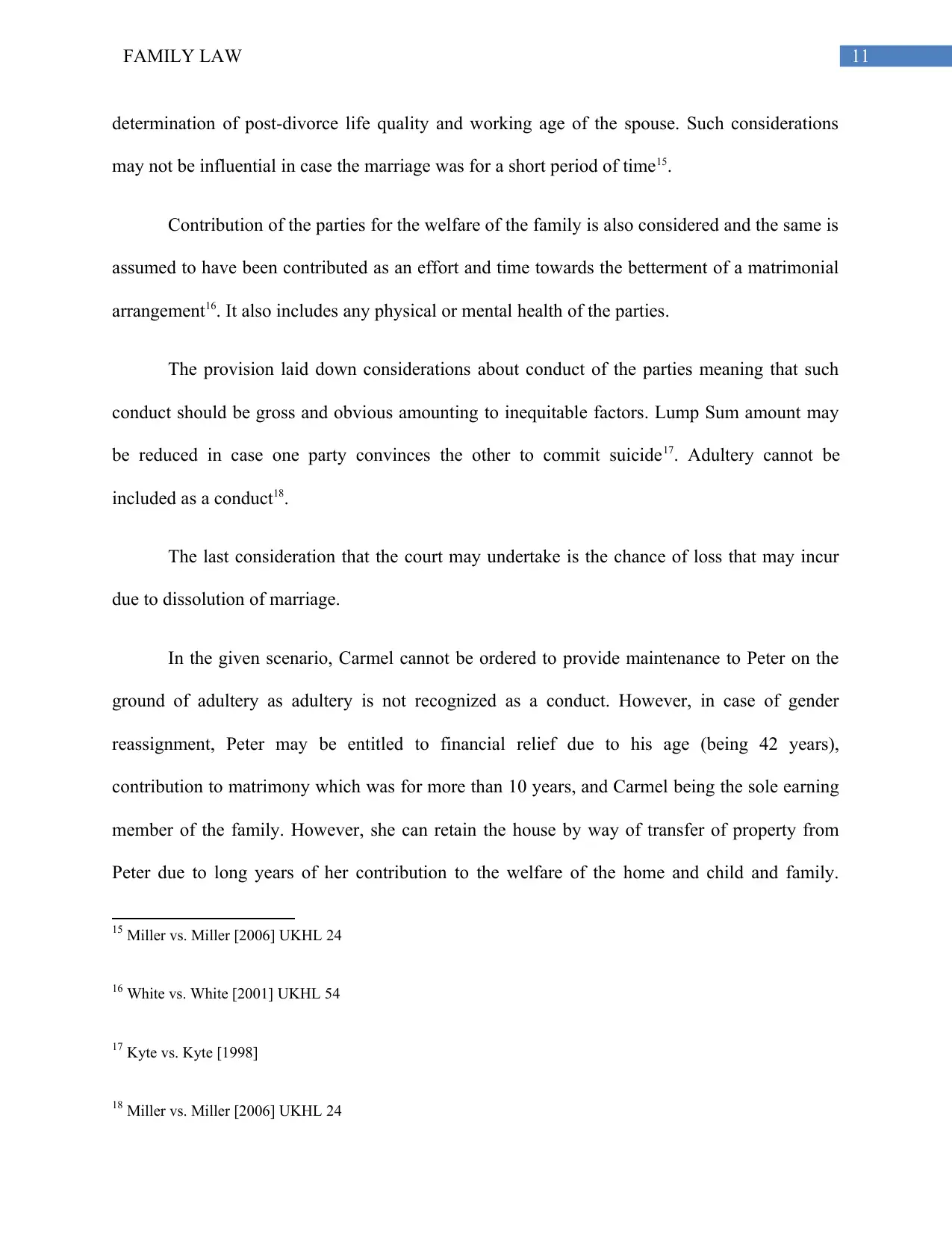
11FAMILY LAW
determination of post-divorce life quality and working age of the spouse. Such considerations
may not be influential in case the marriage was for a short period of time15.
Contribution of the parties for the welfare of the family is also considered and the same is
assumed to have been contributed as an effort and time towards the betterment of a matrimonial
arrangement16. It also includes any physical or mental health of the parties.
The provision laid down considerations about conduct of the parties meaning that such
conduct should be gross and obvious amounting to inequitable factors. Lump Sum amount may
be reduced in case one party convinces the other to commit suicide17. Adultery cannot be
included as a conduct18.
The last consideration that the court may undertake is the chance of loss that may incur
due to dissolution of marriage.
In the given scenario, Carmel cannot be ordered to provide maintenance to Peter on the
ground of adultery as adultery is not recognized as a conduct. However, in case of gender
reassignment, Peter may be entitled to financial relief due to his age (being 42 years),
contribution to matrimony which was for more than 10 years, and Carmel being the sole earning
member of the family. However, she can retain the house by way of transfer of property from
Peter due to long years of her contribution to the welfare of the home and child and family.
15 Miller vs. Miller [2006] UKHL 24
16 White vs. White [2001] UKHL 54
17 Kyte vs. Kyte [1998]
18 Miller vs. Miller [2006] UKHL 24
determination of post-divorce life quality and working age of the spouse. Such considerations
may not be influential in case the marriage was for a short period of time15.
Contribution of the parties for the welfare of the family is also considered and the same is
assumed to have been contributed as an effort and time towards the betterment of a matrimonial
arrangement16. It also includes any physical or mental health of the parties.
The provision laid down considerations about conduct of the parties meaning that such
conduct should be gross and obvious amounting to inequitable factors. Lump Sum amount may
be reduced in case one party convinces the other to commit suicide17. Adultery cannot be
included as a conduct18.
The last consideration that the court may undertake is the chance of loss that may incur
due to dissolution of marriage.
In the given scenario, Carmel cannot be ordered to provide maintenance to Peter on the
ground of adultery as adultery is not recognized as a conduct. However, in case of gender
reassignment, Peter may be entitled to financial relief due to his age (being 42 years),
contribution to matrimony which was for more than 10 years, and Carmel being the sole earning
member of the family. However, she can retain the house by way of transfer of property from
Peter due to long years of her contribution to the welfare of the home and child and family.
15 Miller vs. Miller [2006] UKHL 24
16 White vs. White [2001] UKHL 54
17 Kyte vs. Kyte [1998]
18 Miller vs. Miller [2006] UKHL 24
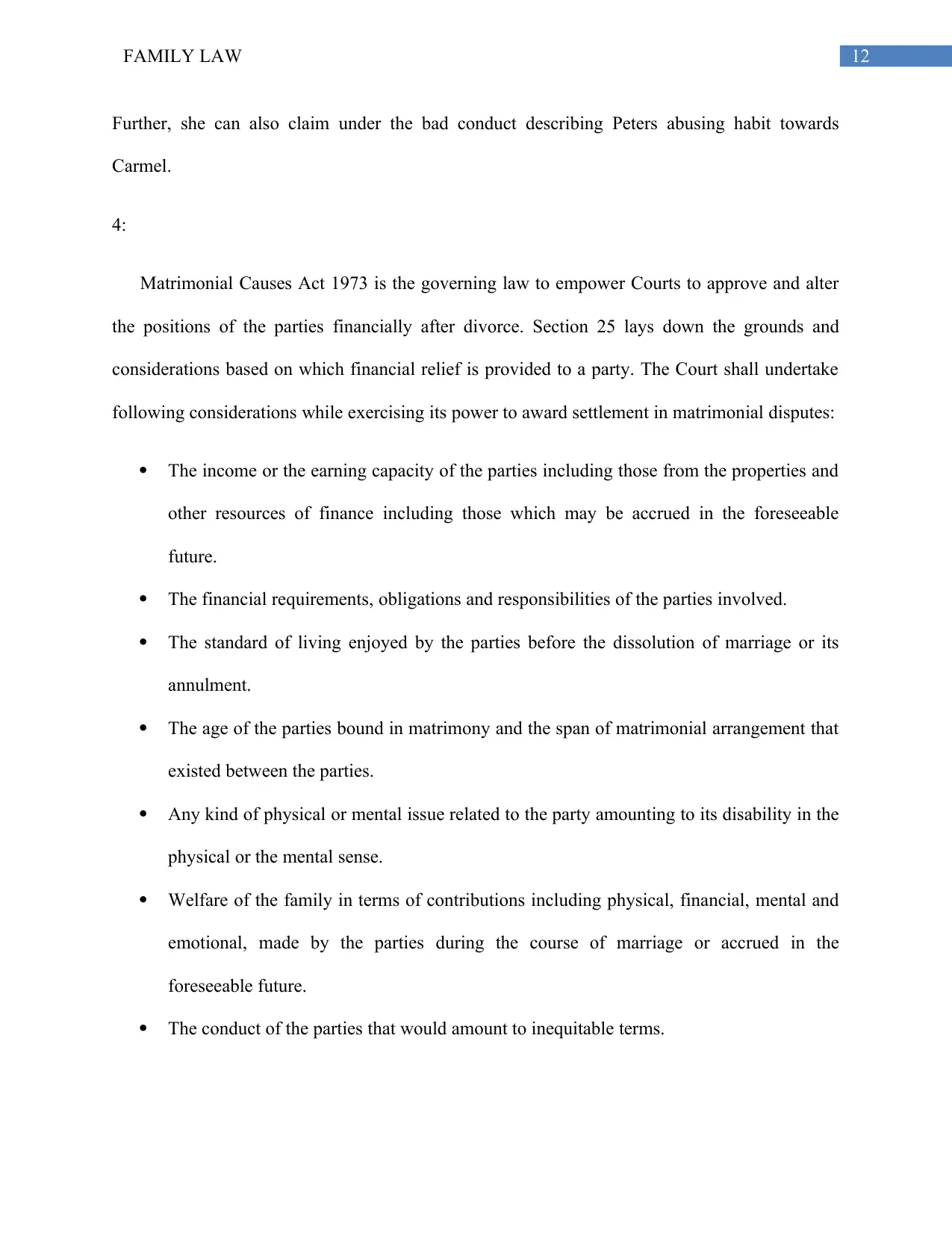
12FAMILY LAW
Further, she can also claim under the bad conduct describing Peters abusing habit towards
Carmel.
4:
Matrimonial Causes Act 1973 is the governing law to empower Courts to approve and alter
the positions of the parties financially after divorce. Section 25 lays down the grounds and
considerations based on which financial relief is provided to a party. The Court shall undertake
following considerations while exercising its power to award settlement in matrimonial disputes:
The income or the earning capacity of the parties including those from the properties and
other resources of finance including those which may be accrued in the foreseeable
future.
The financial requirements, obligations and responsibilities of the parties involved.
The standard of living enjoyed by the parties before the dissolution of marriage or its
annulment.
The age of the parties bound in matrimony and the span of matrimonial arrangement that
existed between the parties.
Any kind of physical or mental issue related to the party amounting to its disability in the
physical or the mental sense.
Welfare of the family in terms of contributions including physical, financial, mental and
emotional, made by the parties during the course of marriage or accrued in the
foreseeable future.
The conduct of the parties that would amount to inequitable terms.
Further, she can also claim under the bad conduct describing Peters abusing habit towards
Carmel.
4:
Matrimonial Causes Act 1973 is the governing law to empower Courts to approve and alter
the positions of the parties financially after divorce. Section 25 lays down the grounds and
considerations based on which financial relief is provided to a party. The Court shall undertake
following considerations while exercising its power to award settlement in matrimonial disputes:
The income or the earning capacity of the parties including those from the properties and
other resources of finance including those which may be accrued in the foreseeable
future.
The financial requirements, obligations and responsibilities of the parties involved.
The standard of living enjoyed by the parties before the dissolution of marriage or its
annulment.
The age of the parties bound in matrimony and the span of matrimonial arrangement that
existed between the parties.
Any kind of physical or mental issue related to the party amounting to its disability in the
physical or the mental sense.
Welfare of the family in terms of contributions including physical, financial, mental and
emotional, made by the parties during the course of marriage or accrued in the
foreseeable future.
The conduct of the parties that would amount to inequitable terms.
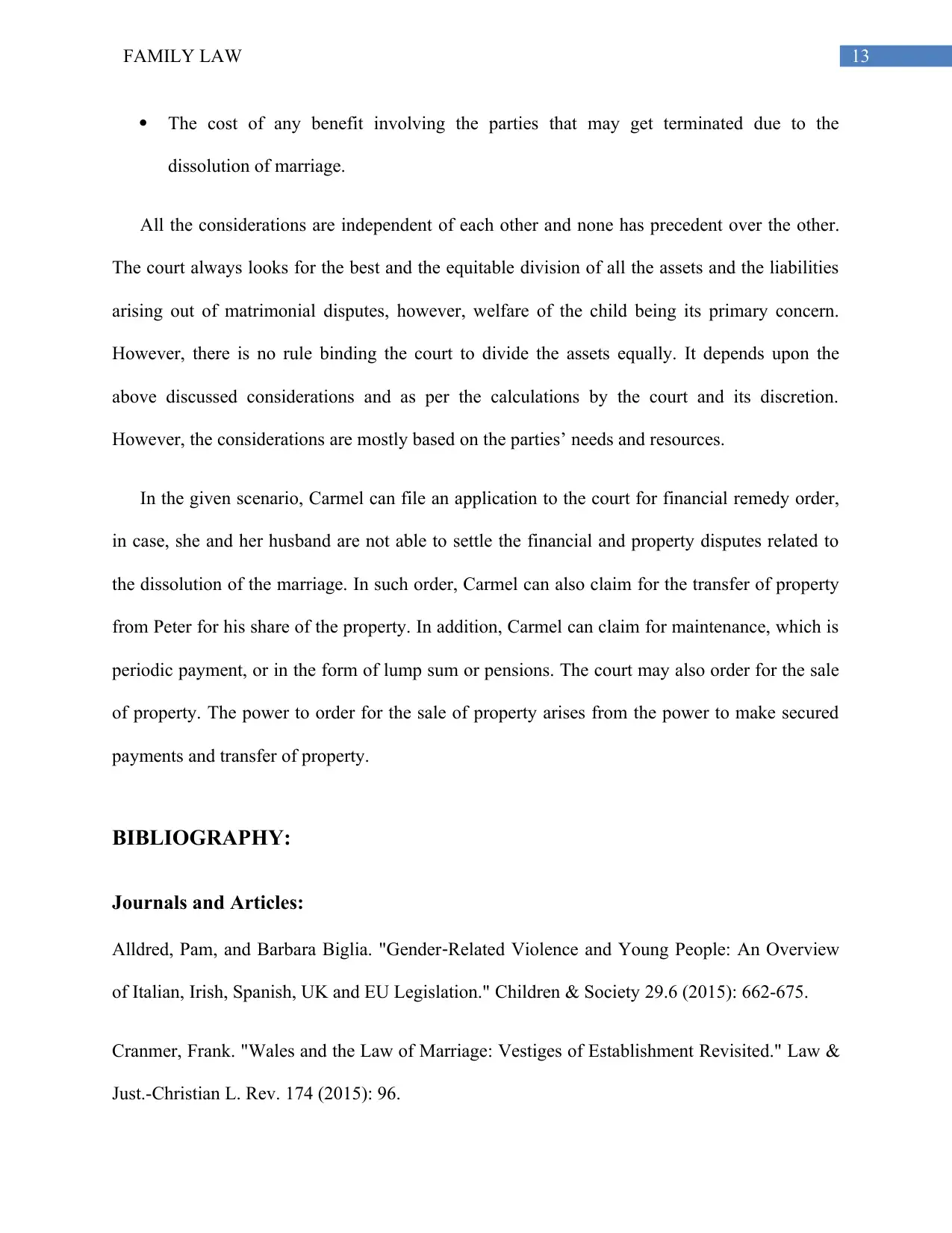
13FAMILY LAW
The cost of any benefit involving the parties that may get terminated due to the
dissolution of marriage.
All the considerations are independent of each other and none has precedent over the other.
The court always looks for the best and the equitable division of all the assets and the liabilities
arising out of matrimonial disputes, however, welfare of the child being its primary concern.
However, there is no rule binding the court to divide the assets equally. It depends upon the
above discussed considerations and as per the calculations by the court and its discretion.
However, the considerations are mostly based on the parties’ needs and resources.
In the given scenario, Carmel can file an application to the court for financial remedy order,
in case, she and her husband are not able to settle the financial and property disputes related to
the dissolution of the marriage. In such order, Carmel can also claim for the transfer of property
from Peter for his share of the property. In addition, Carmel can claim for maintenance, which is
periodic payment, or in the form of lump sum or pensions. The court may also order for the sale
of property. The power to order for the sale of property arises from the power to make secured
payments and transfer of property.
BIBLIOGRAPHY:
Journals and Articles:
Alldred, Pam, and Barbara Biglia. "Gender‐Related Violence and Young People: An Overview
of Italian, Irish, Spanish, UK and EU Legislation." Children & Society 29.6 (2015): 662-675.
Cranmer, Frank. "Wales and the Law of Marriage: Vestiges of Establishment Revisited." Law &
Just.-Christian L. Rev. 174 (2015): 96.
The cost of any benefit involving the parties that may get terminated due to the
dissolution of marriage.
All the considerations are independent of each other and none has precedent over the other.
The court always looks for the best and the equitable division of all the assets and the liabilities
arising out of matrimonial disputes, however, welfare of the child being its primary concern.
However, there is no rule binding the court to divide the assets equally. It depends upon the
above discussed considerations and as per the calculations by the court and its discretion.
However, the considerations are mostly based on the parties’ needs and resources.
In the given scenario, Carmel can file an application to the court for financial remedy order,
in case, she and her husband are not able to settle the financial and property disputes related to
the dissolution of the marriage. In such order, Carmel can also claim for the transfer of property
from Peter for his share of the property. In addition, Carmel can claim for maintenance, which is
periodic payment, or in the form of lump sum or pensions. The court may also order for the sale
of property. The power to order for the sale of property arises from the power to make secured
payments and transfer of property.
BIBLIOGRAPHY:
Journals and Articles:
Alldred, Pam, and Barbara Biglia. "Gender‐Related Violence and Young People: An Overview
of Italian, Irish, Spanish, UK and EU Legislation." Children & Society 29.6 (2015): 662-675.
Cranmer, Frank. "Wales and the Law of Marriage: Vestiges of Establishment Revisited." Law &
Just.-Christian L. Rev. 174 (2015): 96.
Paraphrase This Document
Need a fresh take? Get an instant paraphrase of this document with our AI Paraphraser
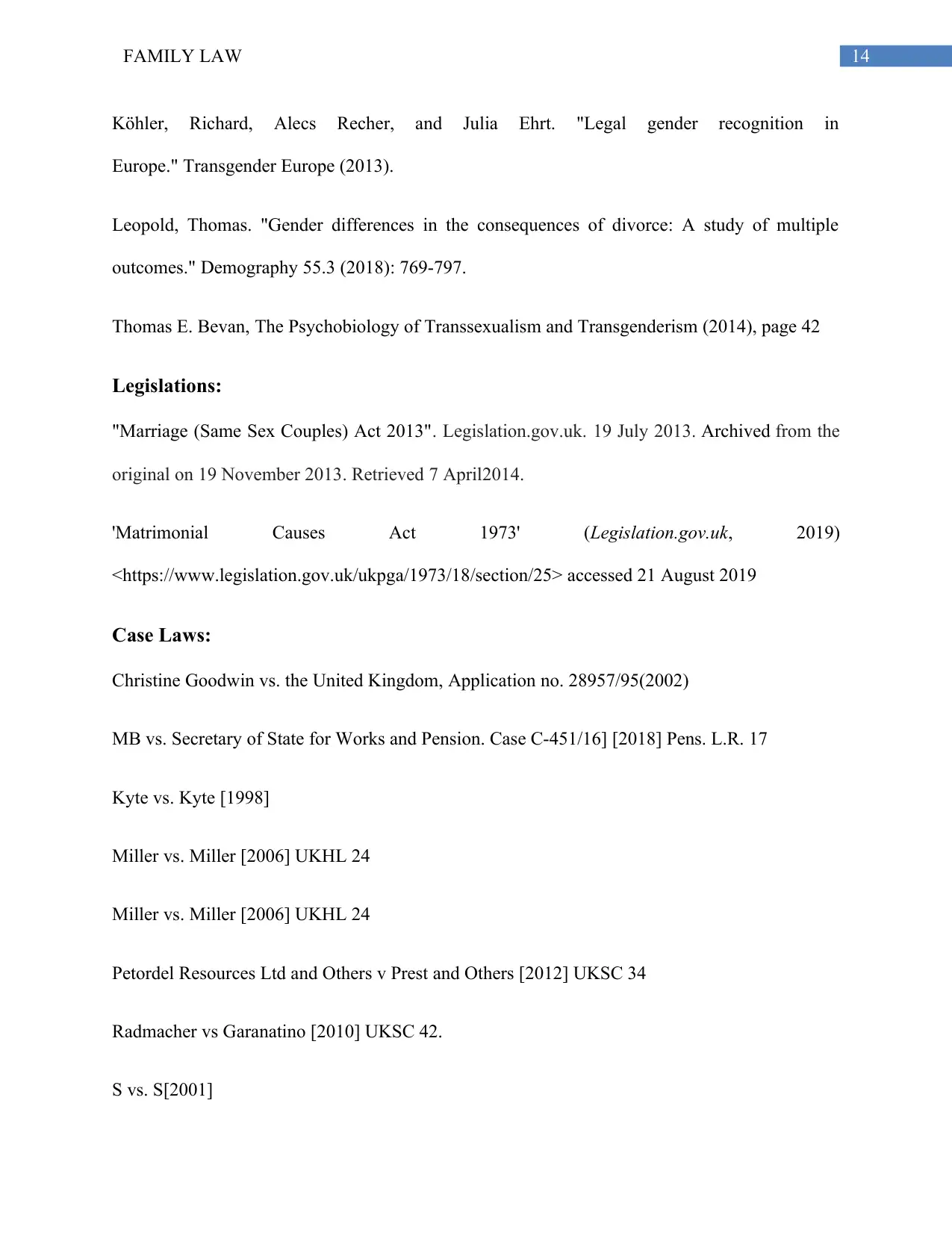
14FAMILY LAW
Köhler, Richard, Alecs Recher, and Julia Ehrt. "Legal gender recognition in
Europe." Transgender Europe (2013).
Leopold, Thomas. "Gender differences in the consequences of divorce: A study of multiple
outcomes." Demography 55.3 (2018): 769-797.
Thomas E. Bevan, The Psychobiology of Transsexualism and Transgenderism (2014), page 42
Legislations:
"Marriage (Same Sex Couples) Act 2013". Legislation.gov.uk. 19 July 2013. Archived from the
original on 19 November 2013. Retrieved 7 April2014.
'Matrimonial Causes Act 1973' (Legislation.gov.uk, 2019)
<https://www.legislation.gov.uk/ukpga/1973/18/section/25> accessed 21 August 2019
Case Laws:
Christine Goodwin vs. the United Kingdom, Application no. 28957/95(2002)
MB vs. Secretary of State for Works and Pension. Case C-451/16] [2018] Pens. L.R. 17
Kyte vs. Kyte [1998]
Miller vs. Miller [2006] UKHL 24
Miller vs. Miller [2006] UKHL 24
Petordel Resources Ltd and Others v Prest and Others [2012] UKSC 34
Radmacher vs Garanatino [2010] UKSC 42.
S vs. S[2001]
Köhler, Richard, Alecs Recher, and Julia Ehrt. "Legal gender recognition in
Europe." Transgender Europe (2013).
Leopold, Thomas. "Gender differences in the consequences of divorce: A study of multiple
outcomes." Demography 55.3 (2018): 769-797.
Thomas E. Bevan, The Psychobiology of Transsexualism and Transgenderism (2014), page 42
Legislations:
"Marriage (Same Sex Couples) Act 2013". Legislation.gov.uk. 19 July 2013. Archived from the
original on 19 November 2013. Retrieved 7 April2014.
'Matrimonial Causes Act 1973' (Legislation.gov.uk, 2019)
<https://www.legislation.gov.uk/ukpga/1973/18/section/25> accessed 21 August 2019
Case Laws:
Christine Goodwin vs. the United Kingdom, Application no. 28957/95(2002)
MB vs. Secretary of State for Works and Pension. Case C-451/16] [2018] Pens. L.R. 17
Kyte vs. Kyte [1998]
Miller vs. Miller [2006] UKHL 24
Miller vs. Miller [2006] UKHL 24
Petordel Resources Ltd and Others v Prest and Others [2012] UKSC 34
Radmacher vs Garanatino [2010] UKSC 42.
S vs. S[2001]
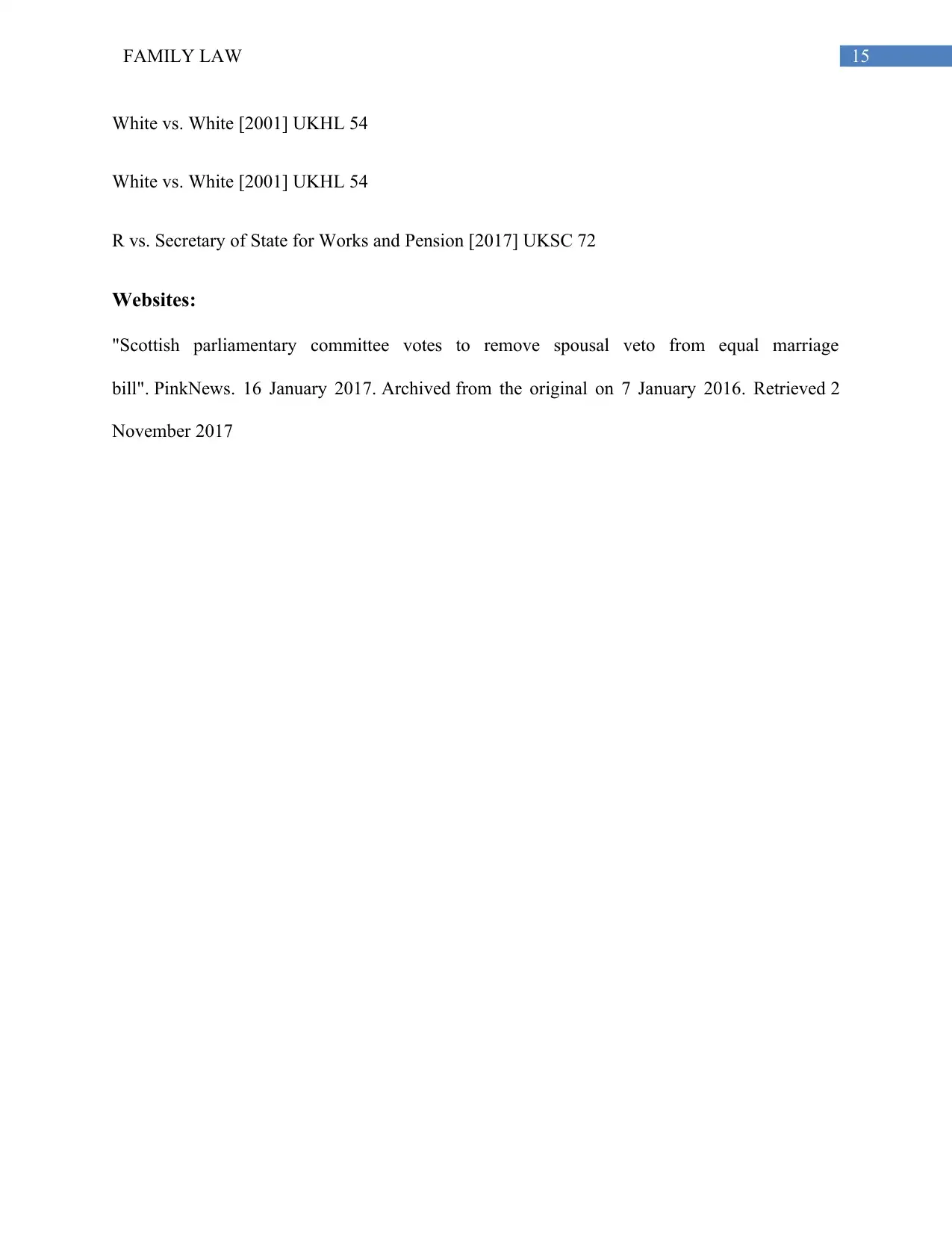
15FAMILY LAW
White vs. White [2001] UKHL 54
White vs. White [2001] UKHL 54
R vs. Secretary of State for Works and Pension [2017] UKSC 72
Websites:
"Scottish parliamentary committee votes to remove spousal veto from equal marriage
bill". PinkNews. 16 January 2017. Archived from the original on 7 January 2016. Retrieved 2
November 2017
White vs. White [2001] UKHL 54
White vs. White [2001] UKHL 54
R vs. Secretary of State for Works and Pension [2017] UKSC 72
Websites:
"Scottish parliamentary committee votes to remove spousal veto from equal marriage
bill". PinkNews. 16 January 2017. Archived from the original on 7 January 2016. Retrieved 2
November 2017
1 out of 15
Related Documents
Your All-in-One AI-Powered Toolkit for Academic Success.
+13062052269
info@desklib.com
Available 24*7 on WhatsApp / Email
![[object Object]](/_next/static/media/star-bottom.7253800d.svg)
Unlock your academic potential
© 2024 | Zucol Services PVT LTD | All rights reserved.





